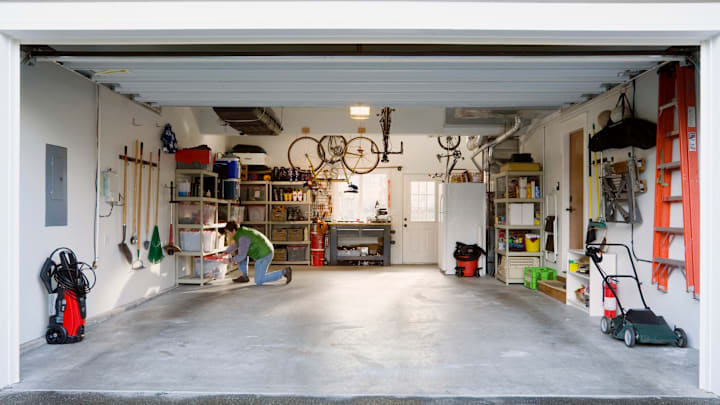Winter can be harsh on your garage-bound belongings. A lack of proper insulation could cause the cold weather to damage your tools and whatever else you have stored there. Liquids may freeze, ultimately becoming unusable or sludge-like. And the frosty temperatures can even lead to costly projects down the road if you don’t take the proper cold-weather precautions. Here are a few things you should do to winterize your garage to prevent such headaches.
1. Get Organized Ahead of Time
Most people don’t want to spend hours in the garage fiddling with a project once the temperatures start to dip. To get ahead of the game, make sure your space is in top shape before it gets too cold to comfortably work. You can do this by cleaning and organizing your garage. Along the way, reduce unessential items to clear up clutter and fix anything that’s broken. This will help you get through the winter without having to duck out into the cold to spend time making repairs or searching for a long-lost item.
2. Weatherize Your Garage
Next, consider weatherizing your garage to make it more efficient during the chillier months. Check for leaks around doors and windows, and recaulk any spaces that might be drafty. Focus on weather stripping to make your space more efficient, and seal any unsealed outlets while you’re at it.
3. Insulate Your Space and Cover Exposed Pipes

Insulation is essential for protecting your garage. If you’ve never insulated your space before, consider doing so before it starts to get cold. You can insulate the whole room to increase the warmth and efficiency of the space, or focus on a few key areas, such as around the door. And if you have storage cabinets in the garage, consider adding a layer of insulation to those as well.
If you happen to have exposed pipes in the garage, you should cover them to prevent any energy loss. Similarly, if your hot water heater is in the garage, insulate it before it starts to get cold. While pipes and heaters don’t necessarily have to be insulated to be safe, they may become a lot more efficient. This can help you save on your energy bills down the line.
4. Waterproof the Floor
Most garages are already going to have a waterproof floor. But if yours doesn’t, you should consider waterproofing it yourself. This essential step will help you protect your home from snow, rain, and mud.
5. Place Liquids in a Temperature-Controlled Area
A lot of garages have a shelf or work bench where people tend to stash things like transmission fluid, oil, or some other type of liquid solution. While many of those fluids can withstand the cold without issue, to be extra safe, you could place them in a temperature-controlled area. This could mean simply moving them to an insulated cabinet or finding space for them inside the house.
Make sure you know how to correctly store each item, as abiding by proper storage protocols can help reduce the risk of fires. Experts suggest ensuring vehicle fluids are clearly labeled and stored in their original container whenever possible.
6. Winterize Your Tools
Another essential step you should take before the cold weather hits is winterizing your tools. Most experts suggest draining any oil that may still be in your tools, since unused oil can turn into a sludge over the course of time. You may also want to use a fuel stabilizer to prevent your gas from going bad. These stabilizers typically last about six months. But if you prefer, you can also run your machines until they run out of fuel. This is also a great time to clean your tools, fix worn parts, evaluate them for potential damage, and change any filters.
7. Buy Rock Salt

If you live in a place where walkways and driveways tend to get icy, you might need to stock up on rock salt to prepare for Old Man Winter. Salt can lower water’s freezing point; this helps prevent ice buildup, which could lessen the chance of any dangerous wipeouts.
8. Invest in a Quality Garage Heater
If you store temperature-sensitive items in your garage, it might not be a bad idea to install a heater in the space. While this strategy isn’t totally essential for everyone, it can help protect your belongings during the most bitterly cold months and keep the area a bit more comfortable.
